
Walk up to someone on the street, ask them what a product manager does, and they’ll probably respond with a blank stare.
But that perception is changing — and fast.
As the world embraces digital, the role of the product manager becomes an essential link between the customer experience and the development process.
It may seem like product management is a natural result of the digital era. But in reality, the role has a rich and varied history that charts its course all the way back from the 1930s.
So, whether you’re a product manager curious about your own legacy or simply someone who isn’t sure what a product manager even does, our brief history of product management should fill you in.
And our journey begins almost 100 years ago...
1931: Where it all began
While product management is now intrinsically linked with digital products, it didn’t actually start that way. Perhaps surprisingly, the origin of the product manager lies in the personal hygiene and healthcare space.
Way back in 1931 — yep, almost a century ago — Neil H. McElroy, a marketing manager at well-known US brand Procter & Gamble, wrote a simple memo expressing the need to hire more people.
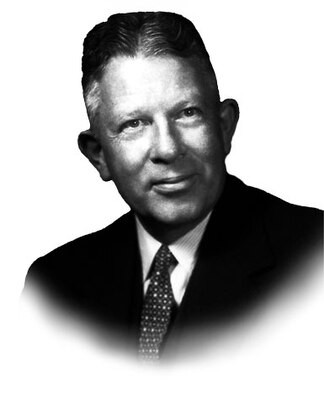
That’s right: it all began with something as every day as an internal memo.
This 800-word document went on to form the basis of the modern product manager, and it did it by way of the “brand man.”
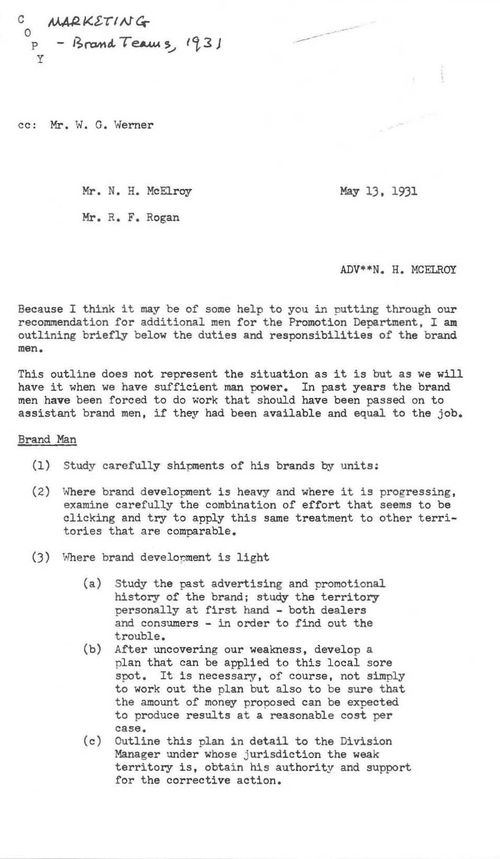
McElroy’s concept described a role that was entirely focused on a single brand or product rather than the business as a whole.
The brand man would be responsible for tracking sales of the product, managing its advertising and promotion, and continuously work on ways to improve it.
This laser-focus on the product was a seed — one that would eventually grow into the product managers of today.
1943: The evolution of the “brand man”
McElroy’s influence over the modern business world didn’t end with his memo.
In fact, he went on to become Secretary of Defense and helped found NASA. Quite the career, right?
On top of all of this, he also found time to advise at Stanford University, and it was here that he met Bill Hewlett and David Packard during the late 1930s. These budding entrepreneurs would, of course, go on to found global computer brand Hewlett-Packard (HP), but not before absorbing McElroy’s concept of the brand man and taking it to the next level.
In fact, as explained in David Packard’s book The HP Way, the company leveraged the brand man model to create sustained year-on-year growth of 20% between 1943 and 1993.
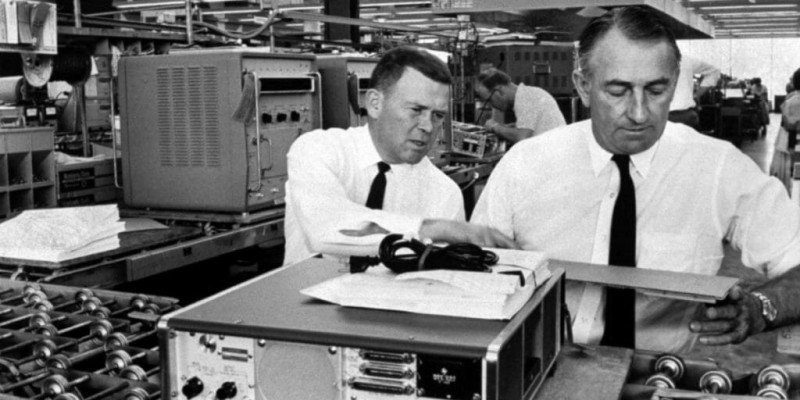
(Bill Hewlett and Dave Packard)
The HP interpretation of the brand man ethos was all about creating an internal customer advocate who would be the voice of the customer throughout product development.
If you’re a product manager today, you’ll recognize this concept because it still underpins the role of modern companies across the board.
1953: Toyota and the arrival of the Kanban board
With a newfound focus on the customer experience across all industries, it’s no surprise that some embraced it more than others.
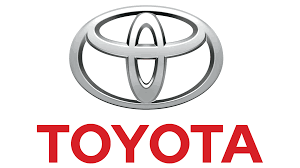
Over in Japan in 1953, the global car brand Toyota experimented with ways to streamline the production process same like some innovative asian brands doing. They aimed to get the product from the drawing board to the customer even faster.
The result of this experimentation was Just-In-Time (JIT) manufacturing, originally known simply as the “Toyota Production System.” This concept is based on the idea that raw material orders can be aligned with production schedules so that waste is minimized and the speed of production is improved.
Because the JIT method relies on tight timescales, Toyota needed an efficient way to track the system.
It’s here that the Kanban board was born.
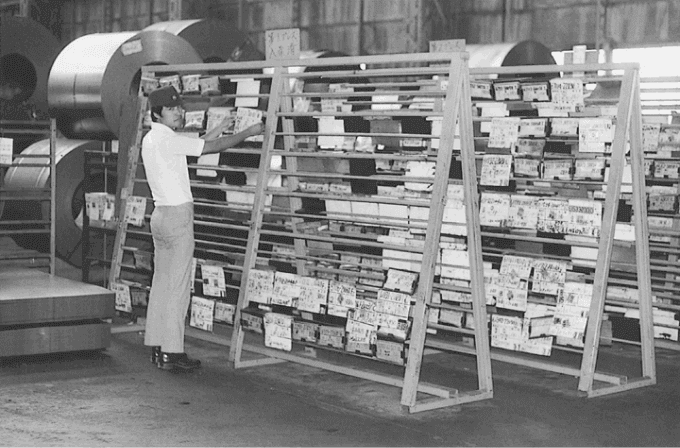
Originally a physical board with cards that could be moved into different categories, the Kanban board created by Taiichi Ohno was used to track the various stages of production.
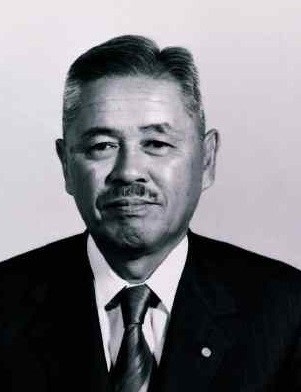
Immediately recognizable to any product manager, the Kanban board is still used to this day (yep, even within airfocus itself) to streamline the product development process.
But these days, it’s more likely to be digital.
A modern-day Kanban board might include a column for "Planned," another for "In Progress," and finally "Ready for Review."
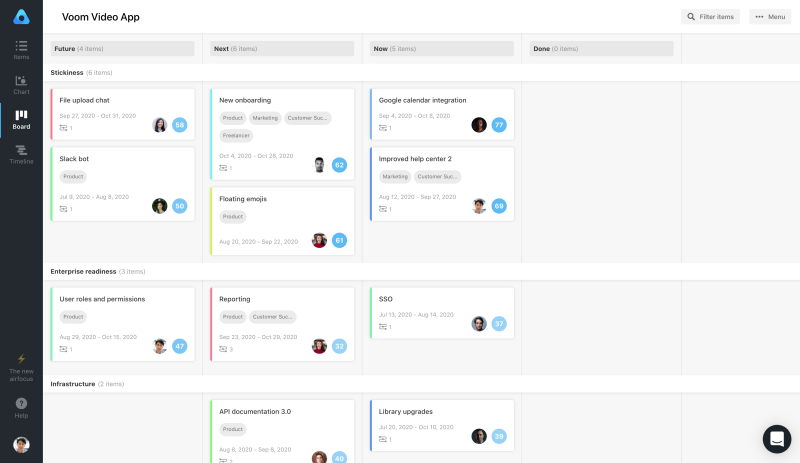
The concept is that a product development team can track their progress visually and keep the project updated for the whole team to see anytime.
The Kanban board’s roots in the realm of physical manufacturing may be what brought the idea to life. However, there was still plenty of work to streamline production for the digital world — and that’s where the agile methodology enters the picture.
2001: The Agile Manifesto and the beginning of the modern product manager
As digital technology came to the fore over the latter half of the 20th Century, it became clear that the processes used by physical manufacturing might not be the best fit for digital ones.
They worked, sure — but they certainly weren’t optimal.
In short, there was plenty of room for improvement.
And that improvement came in February 2001 with the publication of The Agile Manifesto.
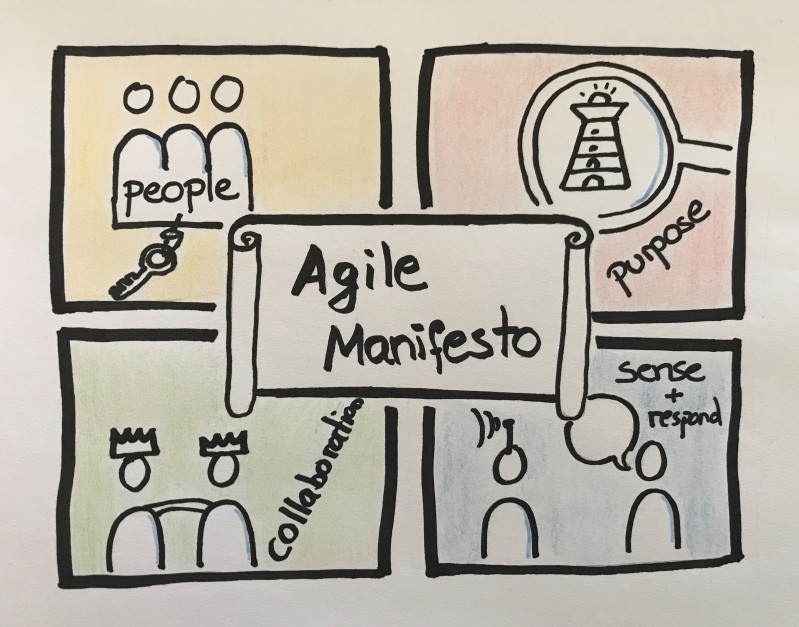
The Agile Manifesto was created by 17 individuals — known today as the Agile Alliance — all of whom were closely involved with software development.
The other common thread?
They all knew things could be done better.

The result was The Agile Manifesto, which sought to define a set of 4 values and 12 principles that would streamline software development end to end.
The manifesto proposed the following values:
Individuals and interactions over processes and tools.
Working software over comprehensive documentation.
Customer collaboration over contract negotiation.
Responding to change over following a plan.
These values were combined with a full list of 12 principles covering everything from prioritizing customer satisfaction to regular team retrospectives.
So, how does the creation of the agile methodology tie into the evolution of the product manager?
Well, they’re almost one and the same. As you’ll know if you’re in product management, agile is now the go-to methodology for software development, and the guidelines detailed in the manifesto still apply today.
Ideas like sustainable development, regular progress reviews, the willingness to pivot in the face of new information, and the number one priority of customer satisfaction are all at the core of most modern development teams.
And that takes us, very neatly, to where we are today.
Today: The rise (and rise) of SaaS and digital products
A quick glance at the modern landscape of digital business, and it’s clear: product management is here to stay.
And the hiring landscape reflects that. Some of the biggest companies in the world are now on the hunt for product managers to develop their offerings in the way that only a product manager can.
Want to know the biggest players investing in product management right now? Here are our picks:
Google / Alphabet. The world’s biggest search engine, and its parent company Alphabet, are a natural fit for the product manager role. With a sharp focus on next-gen machine learning and AI, Google is investing heavily in product development via initiatives like its Associate Product Manager Program. This program is currently led by Brian Rakowski, who joined the company in 2002 as the APM for Gmail.

HSBC. We mention this one because a bank is not the type of business you’d normally associate with product management. The reality is that all businesses are pushing towards digital — and ventures such as mobile apps and rich web experiences require product managers.
Intercom. Intercom's famous RICE scoring framework is still used by product teams around the world. Their framework is centered around the 4 key metrics, which form the acronym RICE. These 4 key metrics are Reach, Impact, Confidence, and Effort. You can learn more about it here or by watching the video below.
https://youtu.be/miI6KvwFHLI
Thanks to the boom in Software-as-a-Service, the role of a product manager is no longer something that raises a quizzical look, at least not for those familiar with the SaaS space.
In fact, in many corners of the internet, product managers are reaching something like rockstar status.
And, with the digital landscape shifting all the time, it won’t be a surprise at all if some of today’s product managers become the pioneers of tomorrow — just like Neil McElroy.
With that in mind, let’s cast an eye over a couple of promising talents in the product management space:
Jules Walter, Former Product Leader at Slack. As one of the world’s most popular communication platforms, Slack is growing — and fast. And leading that charge is Jules Walter, one of the brand’s most prominent product managers.

Lulu Cheng, Product Manager of Discovery Team at Pinterest. Starting her career with brands like Dropbox and Microsoft, Lulu Cheng has now taken her product management talents to Pinterest — one of the world’s fastest-growing social platforms.

Gibson Biddle, Former Netflix Product Manager. Sometimes, the very best examples of product management come from those who’ve seen it all before. In the case of Gibson Biddle, we’re talking about someone who managed features for Netflix as it grew from 2.5 million users to a whopping 12.8 million. Gibson is certainly one to watch.

Of course, there are tons of inspiring product leaders who we didn't include in this article and deserve a spot here. If you want us to expand our list, let us know on Twitter which product leader has inspired you and how.
Where next?
Product management is an ever-evolving field — and it stands on the shoulders of giants.
With so many drastic transformations happening in the tech, SaaS, and B2B space, it’s no wonder that product management has quickly become a sought-after skill set.
And if you’re a product manager or business owner looking to empower your product management team with tools to streamline their workflow, supercharge their output, and boost the bottom line, airfocus is always just a click away.

Andrei Tiburca

Read also


Experience the new way of doing product management

Experience the new way of doing product management






